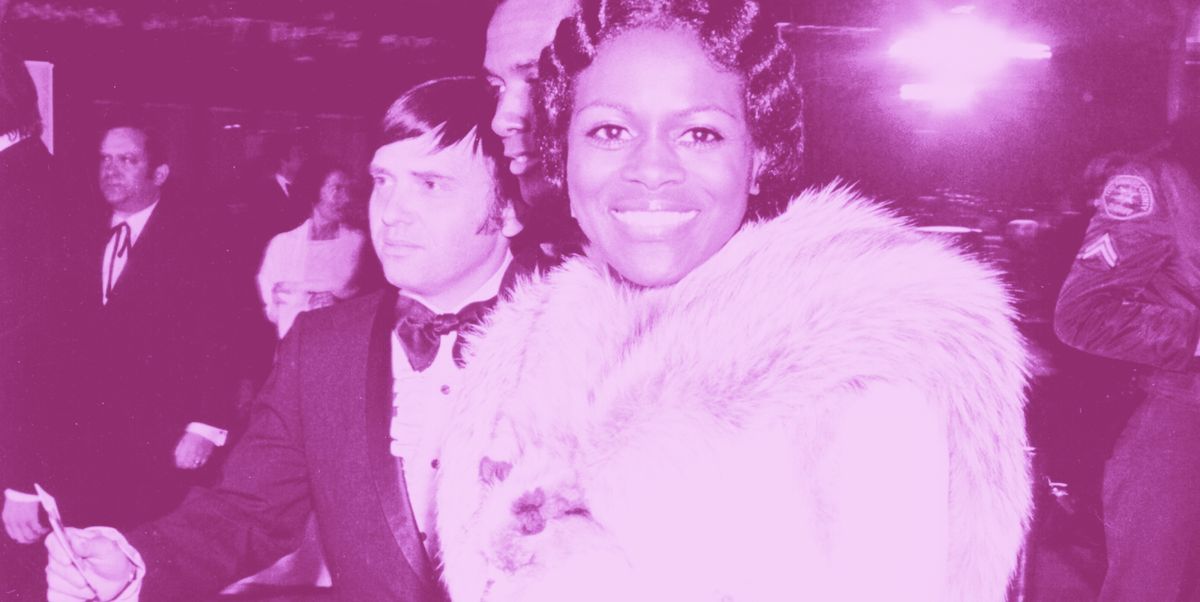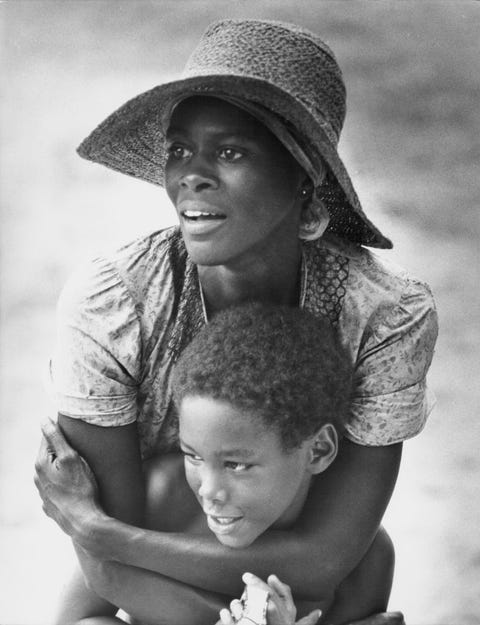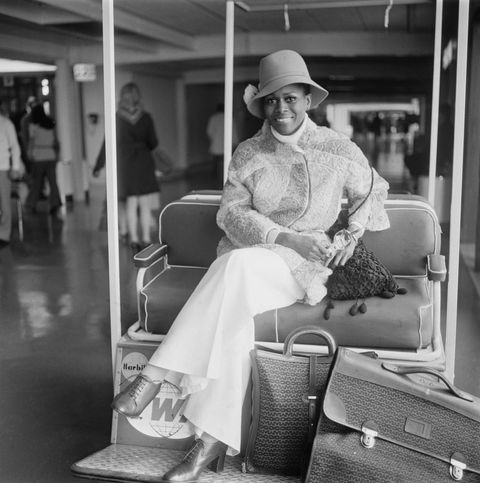The day I learned I’d been nominated for an Oscar, I was filming a small role for a new Black director. Just as I was delivering an important line, I heard laughter on the sidelines of the set. “Don’t they know we’re shooting in here?” I snapped. “What’s the matter with them?” A moment later, a producer walked in. “We’ve just gotten some good news,” he said. I held up my hand. “I don’t want to hear anything,” I told him. “Whatever it is can wait.” When I am working, I show up to do exactly that. All else is a distraction, a disruption to an unfolding moment. The gentleman smiled, shook his head, and left.
The director, who must’ve heard the news that awaited, gave me a strange look before we resumed. We completed the scene, and even on my way out, I wouldn’t let anyone tell me anything. It was upon arriving home, at my agent Haber’s place, that he gave me the exhilarating announcement: I’d been nominated for an Academy Award for Best Actress. “Really?” I said, the living room suddenly swirling out of focus. “Yes!” he yelped. As tears flooded my face, all I could think about were my friend Arthur Mitchell’s words to me: “You’re going to be nominated for an Oscar.” My friend’s what-if had come true.
I don’t care what any actor says, that golden statue matters. It is what we’re all vying for—the ultimate validation from our peers. You empty yourself into a character, you labor hour upon hour to get every single gesture and sentence precise, and you mean to tell me that such an affirmation means nothing to you? It holds tremendous power. When I was just getting into the business, I’d looked on in awe as Sidney Poitier earned that affirmation for his marvelous work in Lilies of the Field, becoming the first Black man to win an Academy Award for Best Actor. That evening, as I watched the ceremony on my old black-and-white RCA set, I said to myself, I’m going to sit in the front at the Oscars one day. That was my dream. But as my career carried me mostly toward stage and television, that hope seemed unlikely. That is why, long before I did Sounder, I’d quietly accepted that the Academy Awards would probably not be part of my path. And yet, lo and behold, here I was, on the verge of taking a seat in that front row I’d envisioned for myself.
My good news was just the beginning. Sounder received a slew of nominations, for Best Picture, Best Writing (Lonne Elder), and Best Actor (I was as delighted for Paul Winfield as I was for myself). The film’s message also reverberated beyond our shores, earning a BAFTA nomination for its score, created by Taj Mahal, who also earned a Grammy for his work. Kevin Hooks, who played my son (and who, in real life, is the son of director and actor Robert Hooks), received a Golden Globe nomination. That awards season also became a landmark recognition of Black talent: Diana Ross was nominated for an Oscar for her role in Lady Sings the Blues, as was screenplay writer Suzanne de Passe. The 1973 nominations for Diana Ross and myself were the first time Black women had been nominated in the Best Actress category since trailblazer Dorothy Dandridge received the honor in 1954 for her role in Carmen Jones.
The morning after the official nomination announcement in Los Angeles, I called my mother in New York. On television, she’d seen how all those white folks had stood and applauded me. “Well?” I said to her. “Well, what?” she said chuckling. “You’d better tell me something,” I said. The line went silent. “I am so proud of you, Sister,” she finally said. I could feel tears brimming and I let them fall, unable to speak because I was so overcome by what I’d longed to hear. If I had not heard those words from my mother, none of this would have made any difference. If she had not been able to participate in the acclaim I was receiving, all of it would’ve felt empty to me.
I, of course, already knew she and my father recognized my work. “Why do you do such sad movies?” my dad once joked after he’d seen me in Brown Girl, Brownstones. Likewise, Mom would often tell me what her friends were always asking her: “Why is she always wearing rags in her movies? Doesn’t she ever dress up?” Though their teasing was an indirect acknowledgment of their pride, I needed my mother, in particular, to voice her validation. She’d been my greatest source of energy, the reason I’d devoted myself so wholly to my work. She had believed I’d go out and become a slut of some kind, had no idea this Hollywood journey could lead me to play a character as honorable as Rebecca. My nomination did more than just prove my mother wrong. After a childhood during which my mother’s opinions drowned out all others, it gave me the last say.
I flew my mother to Los Angeles to attend the screening of Sounder. We were seated in the mezzanine, and she was one row behind me. In the dark, just as the curtains parted, she tapped me on the shoulder. “Ed Sullivan is sitting behind me,” she said, pronouncing his last name Sulli-wan, because for whatever reason, West Indians can’t say v’s. For years, she’d never missed The Ed Sullivan Show on Sunday nights. I turned around and whispered to her, “And I am sitting here.” We both snickered, her loudly enough to prompt Ed Sulli-wan to smile in my mother’s direction.
To celebrate Sounder’s cascade of nominations, the studio hosted a splashy New York premiere. I called upon acclaimed fashion designer Bill Whitten to design my dress (years later, Bill would design Michael Jackson’s rhinestone glove to cover the singer’s early signs of vitiligo). “I want to create the kind of gown that Rebecca might have worn if she’d had money,” I told Bill. That sent him in search of the prints and cottons poor colored women would’ve worn in 1933. Using the fabric remnants he found, he pieced together a treasure. The dress, antebellum in style, came with a fancy apron that served as a flower sack. He filled it with cotton balls he’d sent for from down South. It was the most glorious creation. The same woman who braided my hair for the movie created a crown of beautiful cornrows to complement my look. When I strode into the theater that evening, chin lifted, pride on my brow, I showed up in the name of the ancestors whose sweat and sorrow had carried me there.
In the months leading up to the ceremony, the devil got to work doing what he does best: attempting to pit Black women against each other. In the lead-up to the Oscars, one of Diana Ross’s designers tried to keep my dress from being finished by hiring my designer to make suits for the Jackson Five. I don’t know whether Diana knew anything about it, but I heard the whispers. The media, for months, had been playing up the narrative that there was some big competition between the two of us. I refused to feed into that storyline, which was false. I have never been in competition with anybody but myself, and I wanted no part in such unpleasantness. Just Breathing While Black is trouble enough.
A month before the ceremony, the studio sent me overseas on a promotional tour in Europe, my first time in Paris and London. Months before I left town, I’d rubbed elbows with British royalty. Antony Charles Robert Armstrong-Jones, First Earl of Snowdon, was then husband to Princess Margaret and an avid photographer and filmmaker. Lord Snowdon had taken quite an interest in Arthur’s work at Dance Theatre of Harlem. The two began a partnership, with Lord Snowdon investing in the school. Arthur connected me with him, and during one of Lord Snowdon’s trips to New York, he and I met for appetizers and a brief conversation. As we awaited our order, he kept glancing over his left shoulder. How strange, I thought. I wonder if he’s expecting someone. As it turned out, he was on the lookout for the paparazzi, who of course had followed him to the restaurant. Later, on another one of his trips to New York, Lord Snowdon photographed me wearing that Bill Whitten masterpiece of a dress. What a memory.
In London, the marveling began with my ride from Heathrow in an enormous black taxi, a Hackney carriage so gargantuan that I could stand up inside of it! In a penthouse suite in the Dorchester Hotel, I spent a half-hour just wandering around the space, gawking at the grandeur of the accommodations, thinking back on those days when my siblings, Emily and Melrose, and I had all been squished together on a rollaway bed in our parents’ living room.
And to think that I now had this sprawling space to myself, in a world where my name was plastered on billboards all over America and Europe. It was nothing short of spectacular. The same was true of my time in the City of Light, where, from my balcony, I gazed in awe at the Eiffel Tower, head held high and preening in the distance.
Back in New York before the ceremony, the surrealism continued. In another head nod to Rebecca, I wanted my hair done in a croquignole, the deep-wave style that would’ve been popular for well-to- do women during the 1930s. “Do you know how to do that style?” I asked my hairstylist Omar. “No,” she said, “but my mother can.” Can you believe that child’s mom came out of retirement just to create my waves? The words thank you fell short of expressing the gratitude I felt. Designer Bill Whitten turned up the luxury by creating a white silk-wool fitted dress, with a touch of grey in it, complete with a heart cut-out, lace-trimmed detail across the décolletage. Gracing each sleeve was a glistening row of tiny gold buttons, with the same buttons stretching down the back. It was absolutely stunning.
When Arthur arrived, dashing in his tuxedo, he escorted me by the arm to the awaiting limo. The evening, for us, marked two celebrations: the Forty-Fifth Academy Awards, and my dear Arthur’s thirty-ninth birthday. The quintet of hosts—Carol Burnett, Michael Caine, Charlton Heston, and Rock Hudson—took the stage at the Dorothy Chandler Pavilion. My dream was to be in the front row, and there I sat, delighted that my fantasy had come to pass.
But as for the possibility of garnering the gold statue, I had done my back-of-the-napkin math. I’m logical that way, a pragmatist who is always weighing the odds, and in Hollywood politics, those odds were decidedly not in my favor. That same year, Liza Minnelli had been nominated for her role in Cabaret. Her father, Vincente, was a big-time director, which gave her one advantage. Check. Her mother was Judy Garland. Double check. Neither of them had ever earned an Oscar. Triple check. And at the time, Liza was dating Desi Arnaz Jr., son of Desi and Lucille Ball, Hollywood royalty. Quadruple check. Common sense told me that I had no chance amid the schmoozing and vote-securing that goes on in back rooms.
So as I sat near the stage that evening, I relaxed into the joy of just being there, with Arthur to my left and with Rebecca’s spirit dancing on my shoulder. So certain was I that this was Liza’s year, when Gene Hackman said, “And the winner is…,” I turned to Arthur and said, “Liza Minnelli.” Liza made her way up to the stage, tearful and jubilant, and I sat there, palm over my heart, relishing my presence in the arena. This journey of mine, this path so unpredictable, had somehow carried me from 219 East 102nd Street in the slums to the front row of movie magic at Hollywood’s most grand affair. As Liza accepted her award, I’d already received the only prize I have ever truly wanted—the affirmation of the dear woman who gave me birth.
From the book Just as I Am: A Memoir by Cicely Tyson with Michelle Burford. Copyright © 2021 by Cicely Tyson. Reprinted by permission of HarperCollins Publishers.
This content is created and maintained by a third party, and imported onto this page to help users provide their email addresses. You may be able to find more information about this and similar content at piano.io



